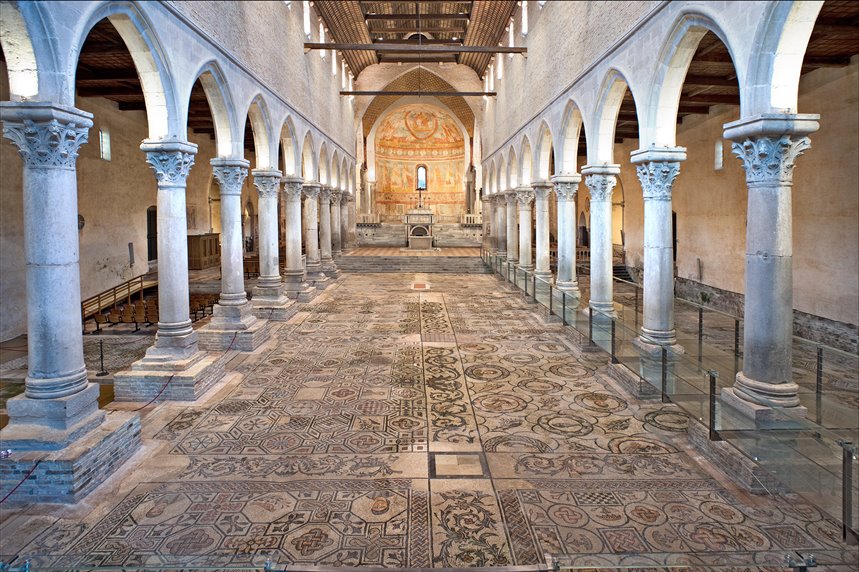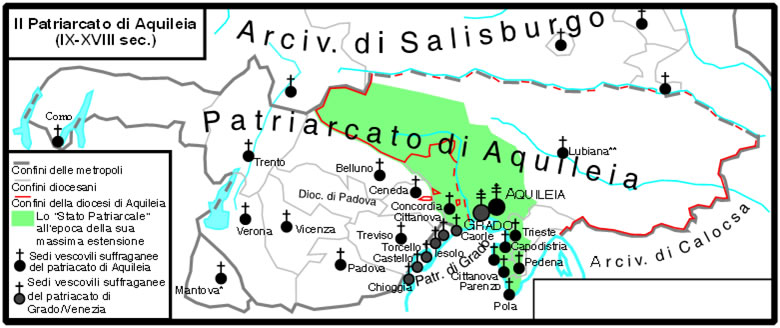CATHOLIC CHURCH: THE RIGHT OF THE FRIULIANS TO PRAY IN THE PEOPLE’S LANGUAGE
By Paolo G. Parovel and Silvia Verdoljak.

Aquileia: the Basilica’s central nave.
Trieste, 25 November 2023. – The Conferenza Episcopale Italiana – CEI (Italian Episcopal Conference) is the permanent assembly of Roman Catholic bishops in Italy. During the plenary assembly of November 15th, in Assisi, the CEI refused to approve the Missal in the Friulian language – Messâl Furlàn. Essentially, an influential minority of Italian bishops is unwilling to recognize the Friulian people’s right to celebrate Christian Catholic rites in their own language.
This is a relevant step backwards, following the 2019 approval, from the CEI itself, of the Friulian language version of the Bible and of the Gospels, which is the result of a restless effort initiated half a century ago by priests pre Checo Placerean and pre Toni Beline together with their colleagues of the group Glesie Furlane (Friulian Church).
According to observers, the current problem is a further confirmation of the fact that there are subjects on which the permanent assembly of Italian Roman Catholic Bishops and its newspaper, “L’Avvenire” are still conditioned by nationalistic political factions, which do also cause problems to Slovenia and Croatia.
The Friulians (Furlàns) are a small European folk of about one million people, they settled in Italy, in the ancient Forum Julii, oggi Friuli – Friûl, which is among Veneto, Austria, Slovenia, Trieste, and the Adriatic Sea. They have their own romance language and culture, consolidated into written documents since the XIII century and in printed literary works since the XVI century.
As for the Christian church, the Friulian people’s tradition dates back to the ancient Roman dioceses of Aquileja, and consolidates in 558 AD in the Patriarchate of Aquileja, with its own traditional rites. Its territory extended far beyond Friuli (reaching Pannonia in the VI century) and its historical and symbolic centre is the big Patriarchal Basilica of Aquileja, built between the XI and the XIII centuries.
From 1077 to 1420 the Patriarchate of Aquileja was an ecclesiastical principality of the Holy Roman Empire, the Patria Fori Julii, in Friulian Patrie dal Friûl and it had its own Parliament of State.
The Parliament of the Patria Fori Julii, or Parlament de Patrie dal Friûl, met for the first time on July 6th, 1221, is among Europe’s oldest, and its competences ranged from consultative roles to lawmaking and judicial decisions. It remained in function until 1805, when Napoleon Bonaparte abolished it.
The plurinational Habsbourg Empire officially recognized the Friulian as a language and as a nationality. Instead, the Italian national State recognized the Friulian language only in 1999, and only for use in the local region.
Indeed, after 1918, Italian nationalism prevented the Friulian language from being used in public religious ceremonies, as it did with the Slovenian language, and it persisted in attempts to prevent it well into the 1970s, opposing the work of the priests of the Glesie Furlane and the will of the believers.
Friulian priests and believers were and are in the right because they live by the principles of the Roman Catholic Church’s Second Ecumenical Council or Vatican II (1962-1965) regarding the natural right to use the language of the people in prayers and in the liturgy, in the Christian gospel spirit of the Pentecost.
They have therefore stood firmly for over a century in the face of the abuses, obstacles, and hypocrisies of nationalistic circles within and outside Roman Catholic hierarchies until 2019, when they finally obtained the approval of the official Friulian language version of the Bible and of the Gospels.
For this reason, the approval of the Missal in the Friulian language was widely expected, especially since it has been in practical use for decades. The politically motivated refusal of the CEI, however, is not only a breach of the spirit of Christianity and of the Roman Catholic Church’s ecumenical principles.
It is, essentially, the violation of a universal ethic principle: the freedom of religion, which, according to one of the main schools of thought on the subject in the United States, is mankind’s first and most fundamental freedom, from which all other freedoms derive.
Glesie Furlane’s protest does therefore deserve full support, and everyone can do so by signing this petition: LINK

The Patriarchate of Aquileia between the IX and XVIII centuries.
